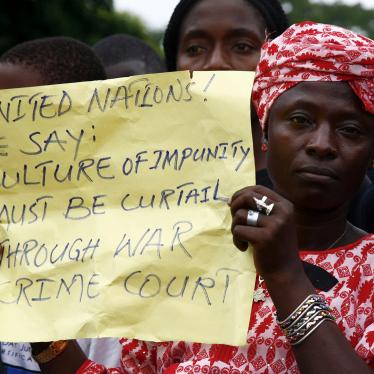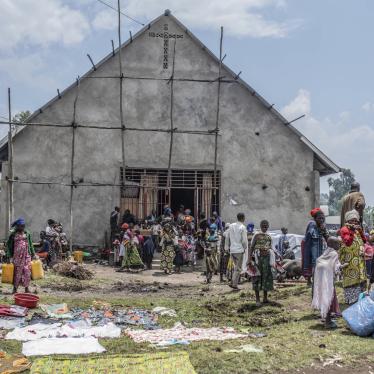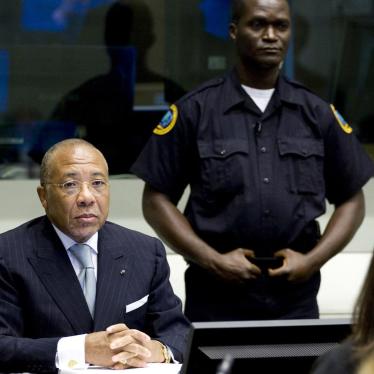September 10, 2020
His Excellency George Weah President of the Republic of Liberia
Re: 75th UN General Assembly High-Level General Debate
Dear President Weah:
We write ahead of the opening of the 75th UN General Assembly to follow-up on your comments during last year’s assembly on accountability for past crimes committed in Liberia. Specifically, we urge you to use your speech scheduled for September 23 during the High-Level General Debate to unequivocally commit to the establishment of a war crimes court for Liberia and to request the assistance of the United Nations in creating the court.
Your statements at last year’s General Assembly on the establishment of a war crimes court were important and welcome:
[T]hat we need to agree on a mechanism that would guarantee the sustenance of peace, stability, justice, and reconciliation, as well as enhance our prospects for economic recovery. Considering the importance of this matter, I have already begun consultations with our National Legislature – the representatives of our people – and we intend to have a broader engagement with the Liberia Judicial System, and with our strategic International Partners and Organizations, in order to determine pertinent issues such as legal framework, timing, venue, and funding, among others.
Concrete progress on a mechanism to ensure accountability for international crimes committed during Liberia’s back-to-back civil conflicts since then nevertheless has been limited. We recognize your administration’s efforts in allowing foreign investigators into Liberia to freely conduct investigations in order to prosecute abroad alleged Liberian war crimes suspects, but more is needed.
We know Covid-19 has brought unique and unprecedented challenges to Liberia, which have delayed progress in many areas of the country. We believe some steps toward ensuring accountability in the country should be possible even in this environment, however, and this will help ensure the needs and rights of victims of brutal crimes committed in Liberia’s wars are met.
Your intervention on this issue would be timely, as efforts by some parts of Liberian society to undermine accountability for past crimes persist. Former warlords are working to block the creation of a war crimes court. The speaker of Liberia’s legislature declined without basis to introduce for consideration a resolution in support of the war crimes court. It is critical that the resolution, which has strong backing among legislators, be put before the legislature’s plenary. Human rights activists
who have championed justice for past crimes, and witnesses of alleged crimes are facing increasing threats.
The General Assembly is an opportunity to reaffirm a commitment to justice for victims and to reinforce that commitment by indicating you will move ahead to request UN assistance in setting up a war crimes court. We thank you for your consideration of this important issue and enclose an annex that offers further background and analysis.
Sincerely,
CSO Human Rights Advocacy Platform of Liberia, which is a network of more than 40 human rights organizations (Liberia)
Flomo Theater Inc. (Liberia)
Foundation for Human Rights and Democracy (Liberia)
Global Justice and Research Project (Liberia)
Global Initiative for Justice (Liberian diaspora organization based in Switzerland)
Human Rights and Protection Forum of Liberia (Liberia)
Independent Human Rights Investigators (Liberia)
International Justice Group (Liberian diaspora organization based in the United States)
Liberia Massacre and Survivors Association (Liberia)
Rights Alert Liberia (Liberia)
Secretariat for the Establishment of a War Crimes Court in Liberia (Liberia)
Transitional Justice Working Group, a coalition of 20 civil society organizations (Liberia)
Advocates for Human Rights
African Center for International Law and Accountability
African Centre for Justice and Peace Studies
Africa Legal Aid
Center for Accountability and Rule of Law (Sierra Leone)
Centre for Civil and Political Rights
Center for Justice and Accountability Children’s Education Society (Tanzania)
Civitas Maxima
Coalition for Justice and Accountability (Sierra Leone)
Human Rights Watch
Human Rights Concern (Eritrea)
International Commission of Jurists Kenya Human Rights Commission (Kenya)
Parliamentarians for Global Action Southern African Litigation Centre
Southern African Centre for the Constructive Resolution of Disputes (Zambia)
Women Advocate Research & Documentation Centre (Nigeria)
List of signatories updated on September 10, 2020 to reflect additional endorsements
cc: Cllr. Musa Frank Dean, Minister of Justice and Attorney-General
Gbehzohngar Milton Findley, Minister of Foreign Affairs
His Excellency Dee Maxwell Saah Kemayah Sr., Liberian Ambassador to the United Nations
Bhofal Chambers, Speaker of the House, Liberian Legislature
Francis Korkpor Sr., Chief Justice, Supreme Court of Liberia
Cllr. Tiawan S. Gongloe, Liberian National Bar Association President
Bishop Korlu K. Brown, Interreligious Council
Chief Zanzan Kawor, Traditional Council of Chiefs and Elders of Liberia
Uchenna Emelonye, Office of the High Commissioner for Human Rights Country Representative
Alyson Grunder, United States Chargé d’Affaires for Liberia
Amb. Helene Cave, European Union Head of Delegation in Liberia
Amb. Hubert Jager, German Ambassador to Liberia
Amb. Neil Bradley, United Kingdom Ambassador to Liberia
Amb. Babatunde Olanrewaju Ajisomo, Economic Community of West African States Ambassador to Liberia
Annex: Need for a War Crimes Court in Liberia
Liberia’s civil wars were characterized by widespread atrocities, including summary executions and large-scale massacres, including at Carter Camp and St. Peter’s Lutheran Church where hundreds of civilians were killed in a single night, widespread as well as systematic rape, mutilation and torture, and forced conscription and use of child combatants.
Fair, credible criminal trials of the worst crimes are vital to building respect for the rule of law and a durable peace in Liberia. International law mandates trials for international crimes including war crimes, crimes against humanity, and torture.
Justice is also crucial because victims, their families, and their communities are entitled to know what has happened, and to see those responsible held to account. Accountability can help to bring facts to light, bolster the rule of law, and increase the prospect of deterring further abuse.
In its final report issued July 1, 2009, Liberia’s Truth and Reconciliation Commission called for the establishment of the Extraordinary Criminal Court for Liberia, a hybrid international-national chamber to try individuals accused of war crimes, crimes against humanity, and other serious violations of international law.
The proposal provides a strong basis for moving forward in pursuing accountability in Liberia. Nonetheless, a number of adjustments would need to be made to the court and its mandate to ensure it aligns with international standards and practice.
For more than 15 years, there have however been no judicial proceedings to hold accountable those responsible for atrocities committed during the two armed conflicts. The few cases seeking accountability for the civil wars-era crimes have all occurred outside Liberia, including the case of Alieu Kosiah, scheduled for trial at the end of 2020 in Bellinzona, Switzerland.
The United Nations Human Rights Committee’s Concluding Observations, issued in 2018, said that the Government of Liberia should make certain that “all alleged perpetrators of gross human rights violations and war crimes are impartially prosecuted and, if found guilty, convicted and punished in accordance with the gravity of the acts committed.”
There is also strong support for a war crimes court in Liberia. Multiple protests calling for accountability and a war crimes court have occurred, including in Monrovia in May and November 2018, and in June and July 2019. In April 2019, the Liberian Bar Association issued a resolution in support of a war crimes court. In September 2019, the Traditional Chiefs Council and the National Economic Dialogue, attended by 350 Liberians from a diverse range of groups, both backed the establishment of a war crimes court.
In a positive step, the Liberian government pledged to cooperate with investigations by foreign governments into past crimes in Liberia and in 2019 began authorizing foreign governments to conduct investigative activities in Liberia.
In July 2019, Liberian legislators then introduced a resolution backing the war crimes court in the country’s legislature. The resolution, which has been endorsed by 52 legislators – more than the 49 required to be adopted, calls for the legislature to establish a court with assistance from Liberia’s international partners.
In September 2019, President Weah sent a letter to Liberia’s legislature asking them “to advise and provide guidance on all legislative and other necessary measures towards the implementation of [Liberia’s Truth and Reconciliation Commission] report, including the establishment of the Economic and War Crimes Court.”
However, since that time, the resolution in support of the court has been blocked from consideration by the legislature’s speaker and there has been no further action in regard to the court by the president. In addition, the UN Human Rights Committee required Liberia to report by July 27,
2020 on the implementation of the recommendations regarding accountability for past crimes, but Liberia has not yet submitted this report.
During this period, civil society organizations prepared a question and answer document to promote understanding and clarify misunderstandings on accountability for past crimes in Liberia, worked with legislators and the Liberian Bar Association on modalities for establishing a court, and provided a stakeholders report on the limited progress toward accountability for Liberia’s UN Universal Periodic Review. The report’s recommendations include calling on the Government of Liberia to:
- Establish an independent committee comprised of government officials, a member of the Independent National Commission of Human Rights, and civil society actors that is mandated to advise the government on justice and the rule of law. The committee should be chaired by a special presidential advisor and be mandated to establish a roadmap on the way forward for ensuring credible trials for past crimes.
- Request assistance from the United Nations, and other international and regional partners to develop a credible war crimes court, and work with the legislature to ensure a war crimes court is established to fairly try war crimes suspects consistent with international standards and practice.
- Guarantee protection for human rights defenders inside Liberia against attacks and intimidation, and to ensure that those who intimidate or attack human rights defenders are brought to justice.







